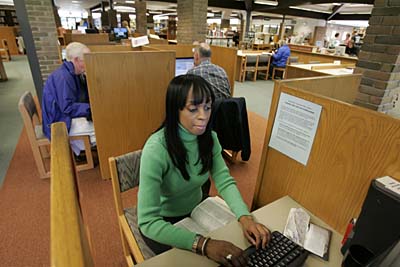Regional thinking doesn't come naturally.
 Photo by Elizabeth Conley, The Detroit News. Lisa LaVallis of Bloomfield Township backs her township library's stance against issuing cards to nonresidents.
Photo by Elizabeth Conley, The Detroit News. Lisa LaVallis of Bloomfield Township backs her township library's stance against issuing cards to nonresidents.Today's Detroit News reports about disputes in the Detroit out-counties about shared library services in "Library Squabbles Could Hurt Readers" . One thing I discovered when I moved from Michigan to Washington, DC is that all the public library systems here practice reciprocity. You have to get separate library cards, but as long as you are a resident of a participating jurisdiction, you can get borrowing privileges. Since I now hang out at the Library of Congress, I don't use this much like I used to, but I used to borrow books from various Montgomery County, MD branches, and I have used PG County MD branches as well. The Arlington County VA main library is supposed to be good, but I have never been there.
From the DC Library website:
Anyone who resides, works, pays property taxes or attends school in the District of Columbia is eligible for a D.C. Public Library borrower's card. Reciprocal borrowing exists for residents of Montgomery and Prince George's Counties in Maryland and Fairfax, Loudoun, Arlington and Prince William Counties and the cities of Falls Church and Alexandria in Virginia to obtain free library cards from the District of Columbia Public Library. Others may apply, after payment of the appropriate fee, for a non-resident library card.
_______________
Actually, a big difference between Michigan and the DC region is that in Michigan, counties are weak governments and provide few services in comparison to the individual cities and towns, and sometimes townships (which actually tend to be weaker than counties).
The Detroit area, like Pittsburgh, is now grappling with providing municipal services on a community by community basis, and various communities are looking at jointly consolidating various municipal services to cut costs, such as these communities looking to merge fire services, and Clawson and Troy looking to merge certain "back of the house" police functions. This is happening both with inner-ring longstanding communities that may be contracting or at least not growing, as well as with out-county townships that are growing rapidly and finding that they need to provide new services to meet the demands of their new residents.



0 Comments:
Post a Comment
<< Home